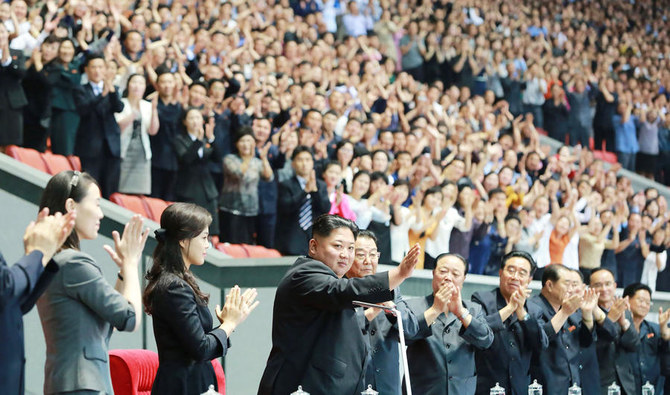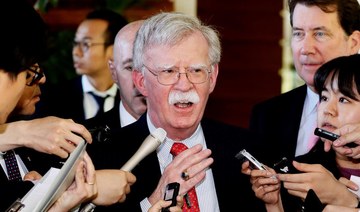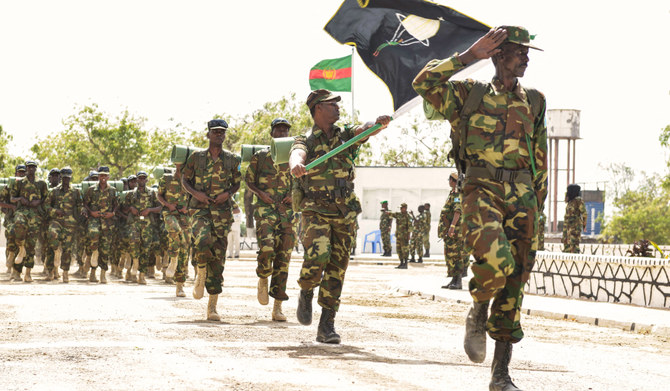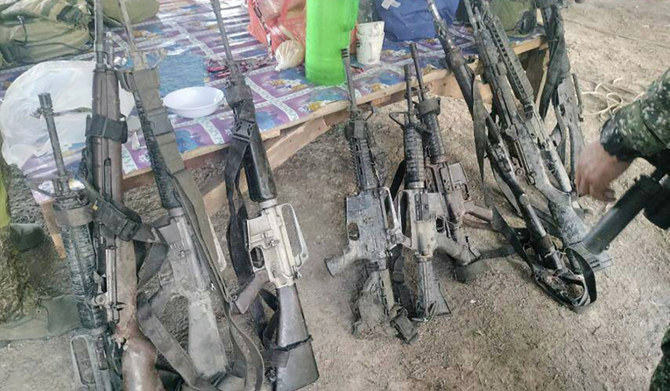PYONGYANG: Tens of thousands of performers took part in a stunning gymnastics show Monday night in Pyongyang as North Korea’s spectacular “Mass Games” propaganda displays began their 2019 run.
Following rehearsals over several months, vast numbers of people in colorful costumes took part in a precision synchronized performance at the cavernous May Day Stadium, portraying moments from Korean history and modern life.
North Korean artistic performances are closely watched by observers for clues as to the authorities’ priorities, such as whether they are highlighting economic achievements or military progress.
North Korean leader Kim Jong Un was at the event along with his wife Ri Sol Ju and his younger sister Kim Yo Jong, the state news agency KCNA said Tuesday.
Kim Jong Un, however, was not entirely satisfied with the production.
After the show “he called creators of the performance and seriously criticized them for their wrong spirit of creation and irresponsible work attitude, pointing to the contents and forms of works,” KCNA said.
Noting that artists “have a very important duty in socialist cultural construction,” the North Korean leader “set forth important tasks for correctly implementing the revolutionary policy of our Party on literature and art,” KCNA said.
Also present at the event were senior government officials including Kim Yong Chol, the North’s counterpart to US Secretary of State Mike Pompeo in nuclear talks.
South Korea’s Chosun Ilbo newspaper had earlier — mistakenly — reported that Kim Yong Chol had been sent to a labor camp after a second summit between Kim Jong Un and US President Donald Trump broke up without agreement in Hanoi in February.
Unmentioned in the KCNA story was Kim Hyok Chol, North Korea’s special envoy to the United States who — according to the Chosun Ilbo newspaper — was executed by firing squad for “betraying the supreme leader” after he was “won over to the US” during pre-summit negotiations.
The show, known in the North as a “Grand Mass Gymnastics and Artistic Performance,” is titled “The Land of the People” and is expected to run for five months, into October.
Traditionally, the scenes on the arena floor take place against an ever-changing backdrop, made up of thousands of children turning the colored pages of books in sequence to create giant images rippling across one side of the stadium.
Guinness World Records lists a 2007 performance of a previous version of the Mass Games, known as Arirang, as the world’s largest gymnastic display, with 100,090 participants.
The resources involved are significant, even though the performers are largely students and schoolchildren. But the impoverished North, which is under several sets of sanctions imposed over its nuclear and ballistic missile programs, does generate tourism revenue from the displays.
This year tickets for foreign tourists cost from 100 euros to 800 euros ($110 to $900), according to Koryo Tours, a Beijing-based agency that organizes trips to the North.
The 2018 show was the first time the North had staged the Mass Games in five years, during which it conducted four nuclear tests along with multiple long-range missile tests, heightening tensions in the region.
But after a rapid diplomatic rapprochement on and around the peninsula, South Korean President Moon Jae-in watched a Mass Games performance last September. His attendance came during a three-day trip to Pyongyang for a third summit with his North Korean counterpart, and Moon made a speech to the crowd.
Moon was instrumental in brokering the first US-North Korean summit in Singapore in June 2018.




























